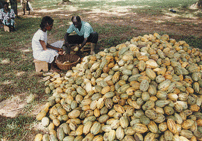Farmer's bonanza
|
Wild
price swings in the international cocoa market since a September
military uprising in Ivory Coast, the world's biggest producer, has
raised the stakes for farmers, traders and chocolate manufacturers
worldwide. Dulue Mbachu reports
|
|||||
While Ivory Coast alone accounts for more than 40 percent of global production with an average annual output of 1.1 million metric tonnes of cocoa beans, more than 60 percent of the entire global crop comes from the same region. Ghana contributes about 400,000 metric tonnes a year, followed by Nigeria with about 180,000 metric tonnes and Cameroon with some 100,000 metric tonnes yearly. Equatorial Guinea and Gabon produce smaller quantities. After record lows in the past three years, cocoa prices were indeed been on a rebound earlier in the year. But when mutinous soldiers in Ivory Coast failed in a September 19 attempt to overthrow President Laurent Gbagbo and quickly seized half of the country in what was shaping up as a civil war, it was a major shot in the arm for cocoa prices. It came at the beginning of the traditional three-month harvest season that lasts till December and touched off record price highs immediately. When the rebel soldiers briefly entered the cocoa industry capital of Daloa, in the country,s central region on October 12, prices immediately touched 17-year highs of $2,405 per tonne in New York and GBP1,635 in London. A cease-fire signed by the parties on October 17 and subsequent peace talks in the Togolese capital, Lome, have since caused a significant decline in prices. But the ears of the market are still keenly gauging the pulse of difficult negotiations. By mid-November cocoa prices had dropped to a seven-month low of $1,841 per ton in New York for December futures and GBP1,176 per ton in London for March delivery. The main price driver had been anxious buying by chocolate manufacturers who had taken short positions and were low on raw material stocks ahead of Christmas holidays, a prime sales period. With peace talks underway some of the anxiety eased while the market awaited a more lasting peace deal. But in the origin countries signs of market nerves were still evident in the high farmgate prices buyers were still willing to pay. In Ivory Coast where the cocoa regulatory authorities fixed 625 CFA per kilo as the minimum price to be paid for cocoa beans during this year's harvest season, prices in November still ranged between 750-800 CFA, down from over 1,000 CFA the previous month. Most exporters still worried about the difficulties of transporting cocoa to the coastal ports due to persisting insecurity. Ghana, the only country in the region yet to liberalise cocoa sales, raised its local prices close on the heels of the start of the Ivorian conflict. Officials said the aim was to discourage widespread smuggling of the country,s cocoa to neighbouring Ivory Coast in search of higher prices. The move pleased Ghanaian cocoa farmers. In Nigeria farmgate prices for a tonne of cocoa in mid-November dropped to around 200,000 naira from 250,000 naira a month earlier. But most traders and farmers reported that little stock was changing hands after heavy sales in October put a lot of the produce in the hands of large buyers and exporters. Most buyers were also playing the waiting game to see if a peace deal in Ivory Coast might lead to further price decline. Industry experts have no doubt that the last two cocoa seasons (2001/2002, 2002/2003) belong to the cocoa farmers. But they also think the situation will invariably prepare the grounds for a downswing in prices towards record lows in the next couple of years. "Peak prices always provide the incentives for over-production in subsequent years," said Terence Hill, a London cocoa market analyst. "Once the market becomes awash with the goods it's only natural that prices will take a dip." Hill's argument is given credence by the fact that key west African producers, including Ghana, Nigeria and Cameroon, have plans to increase production in the coming years. Ghana's immediate concern is to regain the second spot after Ivory Coast, which it recently lost to Indonesia. The Nigerian government has a new policy to bring more land in the southern cocoa belt under cultivation with new varieties of the crop that have shorter maturity period. Cameroon plans to double its production in the next few years. However, a lot will depend on what happens in Ivory Coast both in the short and the long terms. If the current wave of instability and accompanying xenophobia persists, the exodus migrant workers from neighbouring countries, that form the backbone of its cocoa production, will continue. In such a situation the output of the world's current top producer will continue to decline. "In that case there is a chance that other producers might still be able to cash in on their expanding output," said Hill. |
|||||
